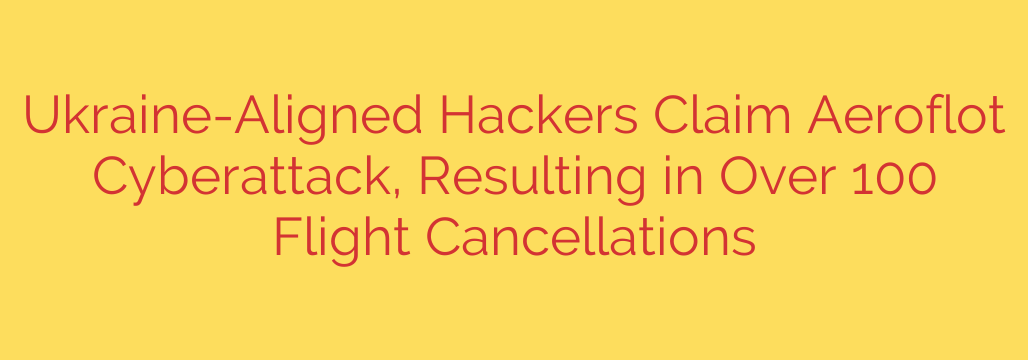
Major Cyberattack on Russian Airline Aeroflot Causes Massive Flight Disruptions
A significant cyberattack has targeted Russia’s national airline, Aeroflot, leading to widespread operational chaos and highlighting the growing vulnerability of the aviation industry to digital warfare. The incident resulted in the cancellation or severe delay of over 100 flights, leaving thousands of passengers stranded and systems in disarray.
The attack, claimed by a pro-Ukrainian hacktivist collective, appears to be a calculated move in the ongoing digital conflict surrounding the war in Ukraine. This event serves as a stark reminder that modern conflicts are fought not only on the ground but also across cyberspace, with critical infrastructure like airlines becoming prime targets.
The Anatomy of the Attack
While full technical details are still emerging, the effects of the cyberattack were immediate and severe. The primary targets were the airline’s core customer-facing and operational systems.
Key impacts of the breach include:
- Disruption of the Online Booking System: The airline’s website and mobile app were reportedly rendered unusable, preventing customers from purchasing new tickets or managing existing bookings.
- Failure of Passenger Check-In Systems: Airport check-in counters and kiosks were crippled, forcing manual processing and causing massive queues and delays.
- Flight Schedule Chaos: The most significant consequence was the cancellation and postponement of more than 100 domestic and international flights, disrupting travel plans for countless individuals.
This coordinated assault demonstrates a sophisticated understanding of airline operations, targeting the exact digital pressure points needed to cause maximum disruption without directly interfering with in-flight aircraft systems.
Hacktivism: A New Front in Modern Conflict
This incident is not an isolated case but part of a larger trend of “hacktivism,” where politically motivated hackers target government and corporate entities to make a statement or cause disruption. Since the beginning of the conflict in Ukraine, both sides have seen a surge in cyberattacks from aligned volunteer hacker groups.
For these groups, targeting critical national infrastructure like airlines, banks, and energy grids is a way to exert pressure and sow discord. The Aeroflot attack underscores that the aviation sector is seen as a high-value target due to its economic importance and direct impact on the public. A successful attack on an airline guarantees widespread media attention and achieves the hackers’ goal of demonstrating their capability and influence.
A Wake-Up Call for Airline Cybersecurity
The vulnerability of a major international airline like Aeroflot should serve as a serious wake-up call for the entire aviation industry. Airlines are vast, complex organizations that rely on an interconnected web of digital systems for everything from ticketing and baggage handling to flight planning and maintenance.
This complexity creates numerous potential entry points for malicious actors. The industry must recognize that robust cybersecurity defenses are not optional—they are essential for maintaining operational integrity, passenger safety, and public trust. Investing in a multi-layered security approach, including network monitoring, regular penetration testing, and employee training, is more critical than ever.
Security Tips for Travelers
While airlines bear the primary responsibility for their security, travelers can take steps to protect their personal information and minimize disruption in the event of an attack.
- Use Strong, Unique Passwords: Never reuse passwords across different services. For every airline loyalty account, use a unique and complex password to prevent credential stuffing attacks.
- Enable Two-Factor Authentication (2FA): If your airline offers 2FA, enable it immediately. This adds a crucial layer of security to your account, even if your password is stolen.
- Be Wary of Phishing Scams: After a major breach is announced, criminals often send fake emails or text messages pretending to be the airline. These “phishing” messages are designed to steal your login credentials or financial information. Never click on suspicious links and always verify communications by going directly to the airline’s official website.
- Monitor Your Flight Status: In the hours leading up to your flight, proactively check its status on the airline’s app or the airport’s website. This can help you avoid an unnecessary trip to the airport in case of a last-minute cancellation.
- Keep Physical or Offline Copies: Have a printed copy or an offline screenshot of your ticket and booking confirmation. If an airline’s systems are down, this can be invaluable for manual processing.
The cyberattack on Aeroflot is a clear signal that the rules of engagement have changed. As digital threats evolve, airlines and passengers alike must adapt to a new reality where cybersecurity is integral to the safety and reliability of air travel.
Source: https://securityaffairs.com/180521/hacktivism/pro-ukraine-hacktivists-claim-cyberattack-on-russian-airline-aeroflot-that-caused-the-cancellation-of-100-flights.html








